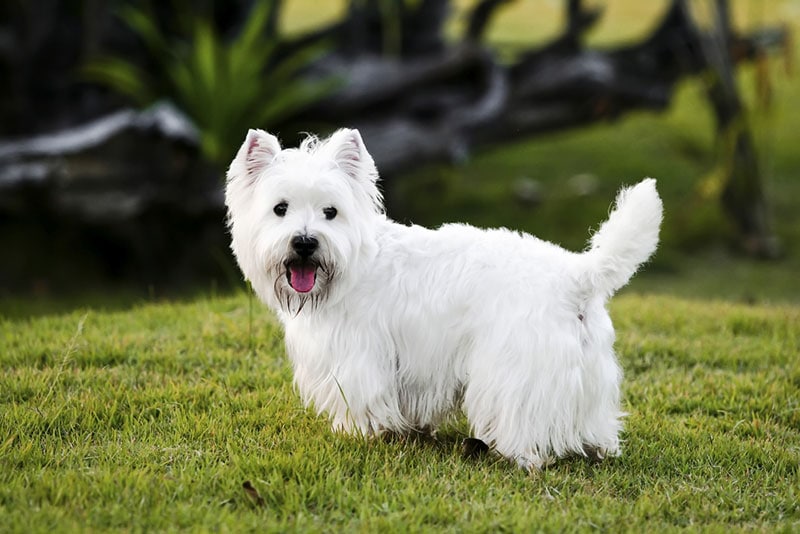Can Dogs Eat Dandelions? Facts & Possible Benefits
Updated on

Click to Skip Ahead
When you let your dog play in your yard, the last thing you think about is whether wild plants can hurt your canine companion. That includes dandelions, which are ubiquitous yellow flowers with puffball-like heads. Can dogs eat dandelions, and do they benefit your pet? The answer to both questions is yes but with several caveats.
We’ll take a look at the facts below so that you can decide for yourself whether to feed these common flowering plants to your pup.
Are Dandelions Toxic to Dogs?
Taraxacum officinalis is the scientific name for a plant more commonly known as dandelion. However there are many species of Taraxacum that all tend to be lumped together under the dandelion heading. The good news about dandelions is that they aren’t toxic and won’t harm your dog under normal circumstances.
The problem (and it’s a big one) is that many homeowners use herbicides and pesticides on their lawns, which are definitely toxic to dogs. In other words, wild dandelions that have never been sprayed with chemicals are okay. However, if you or your lawn-care company use herbicides and pesticides, the dandelions in your yard should be avoided. The same goes for those found on roadside verges.
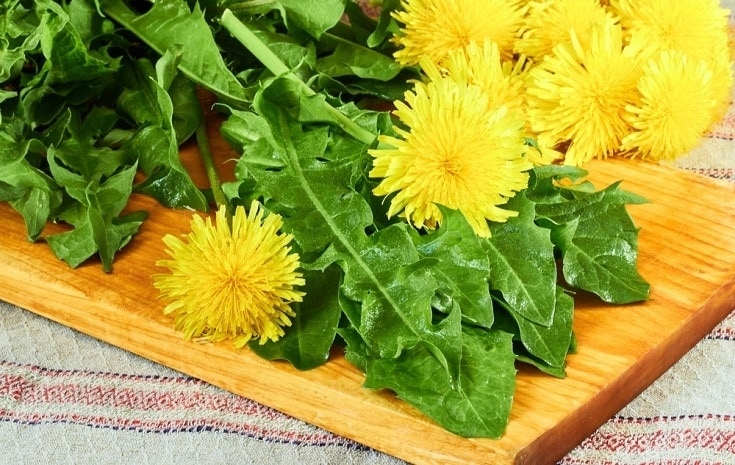
Which Parts of the Dandelion Are Edible for Dogs?
Like all plants, dandelions have edible parts and some that should be thrown away. Below are the three parts of the dandelion plant that are safe to feed your dog and offer the most nutritional benefits. Stay away from the stems since they contain compounds similar to laxatives.
1. The Blooms
The bright yellow flowers of the dandelion and the seed puffs can be eaten without ill effects. Watching your dog try to eat a seed puff can also be entertaining!
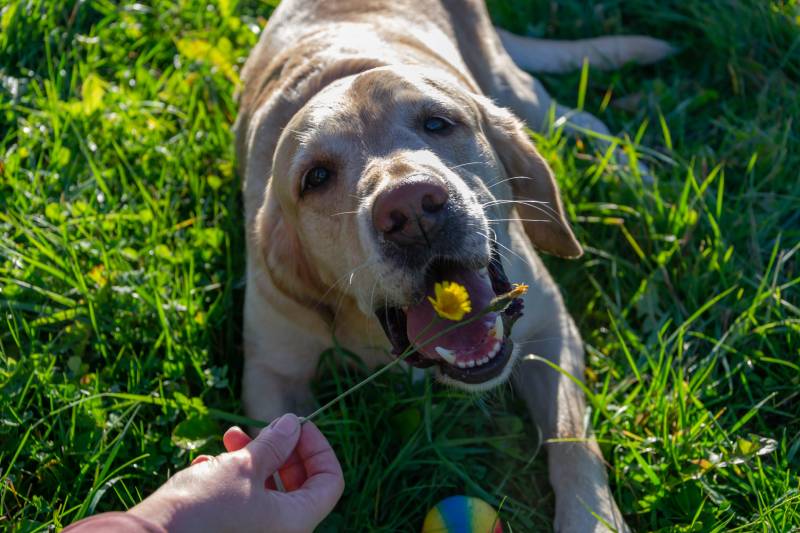
2. The Leaves
As with many plants, the most nutrient dense part is the leaves, and that holds true for dandelions also. The leaves are what most pet owners feed their dogs.
3. The Roots
Surprisingly, the roots of the dandelion plant offer quite a bit of nutritional benefit for your dog, both in their raw form and when cooked. They need to be cleaned well, though, as they’ll be covered in dirt.
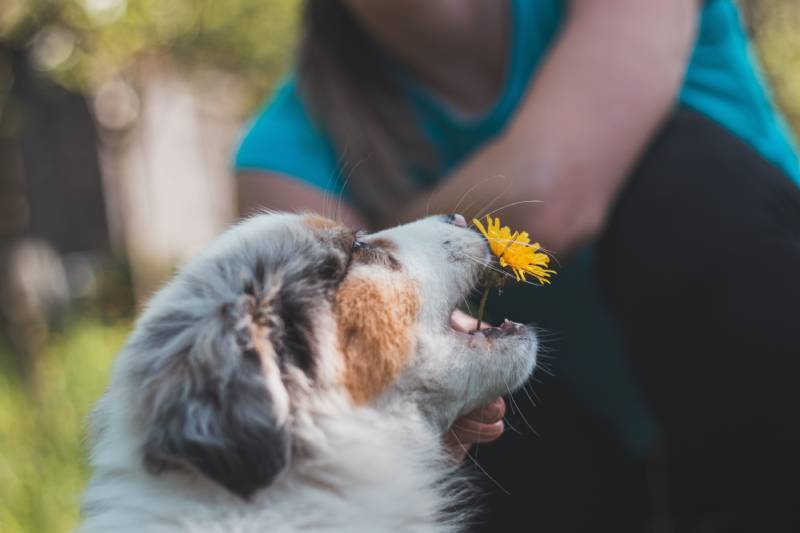
Which Nutrients Are Found in Dandelions?
There are a wide variety of nutrients found in dandelions, many of which will benefit your dog.
- Antioxidants
- Phosphorous
- Potassium
- Protein
- Trace minerals
- Vitamins A, B-complex, C, D, and K
What Health Benefits Do Dandelions Provide Your Dog?
As mentioned above, three parts of the dandelion are edible for dogs and provide some nutritional benefits, which you’ll see below. Dandelions have long been used in herbal and complementary medicine in humans. There are studies to support that they have many benefits due to the different phytochemicals contained in the plant. However we could not find studies into their use in dogs and so much of the information is presumed to be extrapolated from humans.
1. The Blooms
Dandelion blooms contain high concentrations of antioxidants, including vitamins A and many B vitamins. Antioxidants are famous for destroying free radicals, which can increase the risk of cancer and other diseases. They could also improve your pet’s immune system, which empowers them to fight off other illnesses and health issues.

2. The Leaves
The leaves of the dandelion are packed with nutrients and are the most nutritious part of the plant. They contain a probiotic called inulin which offers several benefits. Inulin improves the health and wellness of your dog’s GI tract and will help the good bacteria in your dog’s intestines prosper and propagate, aiding digestion.
A tincture or extract made from dandelion plants has been shown to improve a dog’s gallbladder function. Also, the dandelion is a diuretic that can be beneficial in certain illnesses and act as a laxative when given in the proper dose.
3. The Roots
When processed correctly, Dandelion roots have impressive anti-inflammatory properties that could be highly beneficial for dogs. For example, they can reduce inflammation associated with joint disease. Dandelion root extract is also said to help your pet recover more quickly after strenuous exercise or when recovering from an injury. Also, the potassium and manganese in dandelion roots can help your dog’s teeth and bones stay strong and healthy.
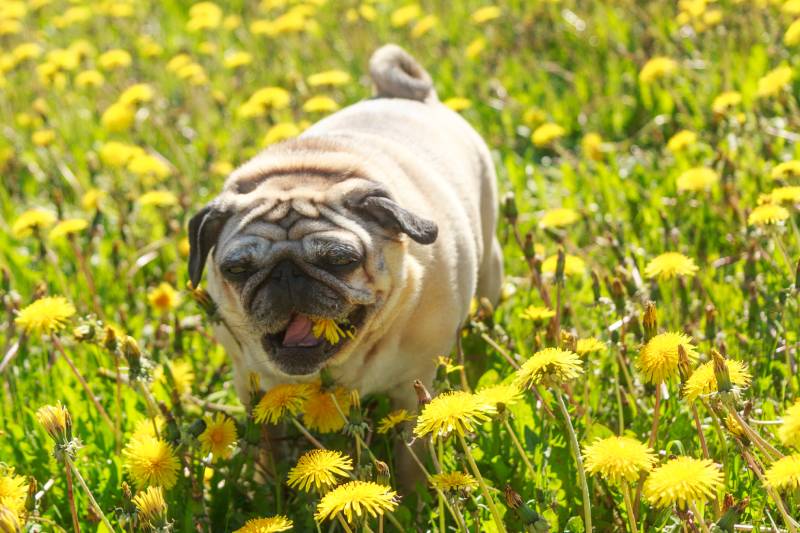
Do Dandelions Have Any Health Risks for Dogs?
While dandelions aren’t toxic for dogs in moderation, and if they’re fresh, clean, and chemical-free, there are several health risks associated with feeding them to your dog. They include the following:
1. Pesticide Poisoning
As mentioned earlier, many dandelions found in yards across the United States have been sprayed with pesticides and herbicides, which are highly toxic for dogs and can poison them. You must know precisely where your dandelions come from before feeding them to your pet.
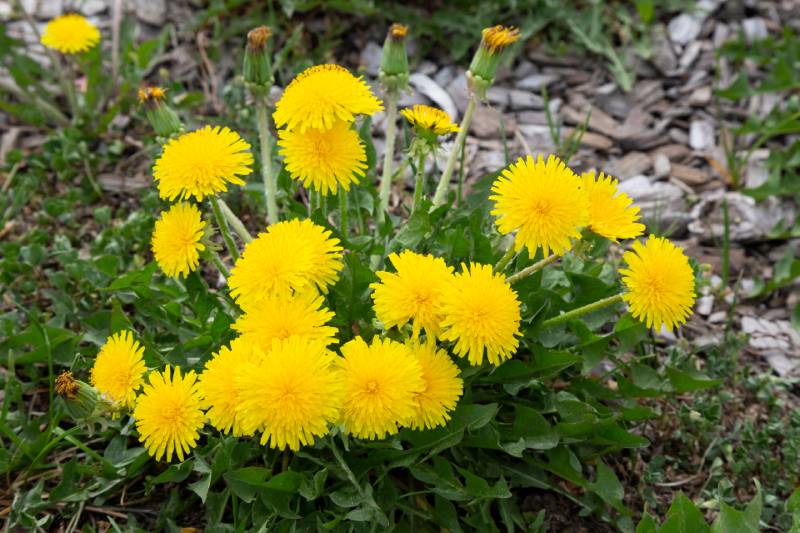
2. Digestive Tract Issues
Although fresh, clean dandelions aren’t toxic, all dogs are unique, and yours may have a food intolerance to the plant. If it does, some signs you might see include diarrhea, vomiting, and indigestion.
3. Dehydration
Dandelions are a diuretic that will cause your canine to urinate more frequently. Feeding your dog too many could cause dehydration.

How to Feed Dandelions to Your Dog
There are several ways to feed dandelions to your dog as a snack or a health tonic. For example, you can add fresh dandelion leaves directly to your dog’s food or blend them with water and add it to their food. Depending on your dog’s size, two to four leaves should be sufficient.
Many dog owners make dandelion tea from the leaves, roots, and flowers. This can be added to your dog’s water bowl or poured into their food. Remember, however, that dandelion is a diuretic that will make your dog urinate more if you serve too many.
We recommend discussing with your veterinarian or a veterinary nutritionist if you wish to incorporate dandelions into your dog’s diet. If however your dog is just fond of munching plants in your lawn, monitor for any signs of ill health and contact your vet for advice if you are concerned.
Final Thoughts
Dogs can eat dandelions, and the plant’s roots, stems, and leaves contain various nutritious compounds, vitamins, and minerals. The biggest drawback to giving dandelions to your dog is poisoning due to pesticides and herbicides, so be sure to choose your dandelions carefully and wash them thoroughly.
Also, it begs repeating that you should only feed dandelions to your dog in moderation. If you have dogs and want to give them a nutritious treat, you now have a reason to let the pretty yellow plants grow in your yard unfettered.
Related Read:
- Can Dogs Eat Hibiscus? Vet-Approved Facts
- Are Asparagus Ferns Poisonous to Dogs? Vet-Reviewed Toxicity & Alternatives
Featured Image Credit: Anastasia Marushko, Shutterstock





